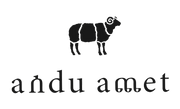Hello frim Ethiopia, this is designer of andu amet, Hiroko Samejima.
「We want to improve our products even more. As if answering our wish, a reliable support arrived at our atelier in Ethiopia the other day.
We welcomed Mr. Nakamura, who has been involved in handbag manufacturing for many years at N.K. Co., Ltd. The company has also obtained the international certification “B Corp,” which andu amet also holds.
Drawing on their extensive experience cultivated in Japan's manufacturing field, they generously shared their expertise and systems for improving quality.

Transforming experience-dependent skills into skills anyone can master
Until now, in our atelier, our artisans have built their skills through trial and mistake, relying on experience and intuition.
But then, it's difficult to produce consistent quality no matter who makes it.
In this technical guidance session, we first began by reviewing the fundamentals of sewing and sewing machine adjustments.
The angle of the needle, the pressure of the presser foot, the stitch width, how the zipper is attached—just the slightest adjustments can make such a difference in the finished result...
Actually, we had just imported and completely replaced our industrial sewing machines with JUKI models last year.
I thought sewing machines available in Ethiopia would be easier to repair and find parts for, making them more sustainable, but there were inherent limitations in terms of quality.
Since introducing JUKI sewing machines, the beauty, strength, and consistency of our stitching have improved dramatically. This time, we've taken it a step further by introducing specialized attachments and supporting tools, enabling us to achieve even more consistent results.
At first, the craftsmen were confused by the new method, but day by day, their expressions grew increasingly proud as they realized, “This really does make it harder to mess up,” and “It turned out much faster and cleaner than before.”

A system that conveys meaning even without literacy
Some staff members at the workshop struggle with reading and writing. While manuals and other rules were created in the local language, relying solely on written communication sometimes failed to get the message across. This was also one reason for inconsistent quality.
Therefore, this time,
-
Redesign the patterns from scratch to make them easier for anyone to understand
-
Changed the inspection process to one where “you can tell just by looking,” making extensive use of photos and symbols
-
Introduced a new jig ( supporting tool) to assist with assembly
By refining our visual communication methods, both work speed and the consistency of results have significantly improved.
The greatest achievement is hearing comments like“I can do it too” and “My mistakes have decreased”naturally emerging from the workplace.



A glimpse of true feelings
On the final day of technical guidance, we held a small lunch party at the workshop to express our gratitude to Mr. Nakamura. During the gathering, the factory manager shared this story with us.
"In Ethiopia, opportunities to learn and access to information are extremely limited. That's why we're truly grateful to be taught the necessary skills like this.
What we want isn't money. With knowledge and skills, we can create better things with our own hands. Nothing makes us happier or prouder than knowing we can start making even higher-quality products tomorrow."
At those words, the surrounding craftsmen nodded deeply in agreement.
The desire not to rely on aid is actually strongest among the people themselves.
With learning alone, we can carve out our own future—that conviction came through quietly, yet powerfully.
Mr. Nakamura said
"If you notice something off along the way, have the courage to start over. Don't hide it or brush it off—stop and reevaluate. Creating something truly good ultimately benefits both yourself and your customers."

Continuing is what connects us to the future.
By the way, technical guidance from Japan is not a one-time initiative limited to this occasion. At andu amet, we invite specialists from Japan to the field on an irregular basis for ongoing guidance. Frankly, it's not easy to find people willing to stay long-term in Ethiopia, where electricity, water, and even the internet are unreliable. However, we believe there is value in persevering steadily.
Fair trade isn't just about “paying fair wages.” It's about providing workers with learning opportunities and chances for growth “long-term,” enabling them to create truly excellent products as a result. It's about customers valuing that craftsmanship, allowing it to continue into the next cycle, and then the next. Only within this “sustainable cycle” can brands, workshops, and the future itself keep moving forward.
With all our heart, always.
We bring you bags from Ethiopia that will be cherished by everyone for generations to come.










